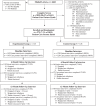Sharing health care wishes among older adults with cognitive impairment in primary care: Results from a randomized controlled trial
- PMID: 39189632
- PMCID: PMC11485067
- DOI: 10.1002/alz.14210
Sharing health care wishes among older adults with cognitive impairment in primary care: Results from a randomized controlled trial
Abstract
Introduction: Best practices for conducting advance care planning (ACP) among persons with cognitive impairment exist, but evidence-based models are lacking for the primary care setting.
Methods: We tested a remote multicomponent ACP model (SHARE) versus minimally enhanced usual care in 273 person-family dyads from eight primary care practices.
Results: Mean patient age was 88.0 years, 85 (31.1%) were Black/Latino; 189 (69.2%) had moderate-to-severe cognitive impairment. Most (101/145; 69.6%) intervention dyads engaged in ACP. At follow-up, no treatment effect was observed for care partner-reported quality of communication about end-of-life care at 6 or 12 months, but intervention patients reported better quality of communication about end-of-life care at 12 months. Intervention care partners and patients reported greater readiness to engage in ACP at 6 and 12 months, respectively, and increased completion of key aspects of ACP.
Discussion: SHARE supported key aspects of ACP processes and communication about end-of-life care.
Highlights: Primary care-based models of ACP for persons with dementia are lacking. Involving persons with cognitive impairment in remote ACP is feasible with care partner involvement. Results indicate benefit for aspects of ACP processes and communication about end-of-life care.
Keywords: advance care planning; cognitive impairment; primary care; randomized controlled trial.
© 2024 The Author(s). Alzheimer's & Dementia published by Wiley Periodicals LLC on behalf of Alzheimer's Association.
Conflict of interest statement
The authors declare no competing interests to report. Author disclosures are available in the supporting information.
Figures


References
Publication types
MeSH terms
Grants and funding
LinkOut - more resources
Full Text Sources
Medical

